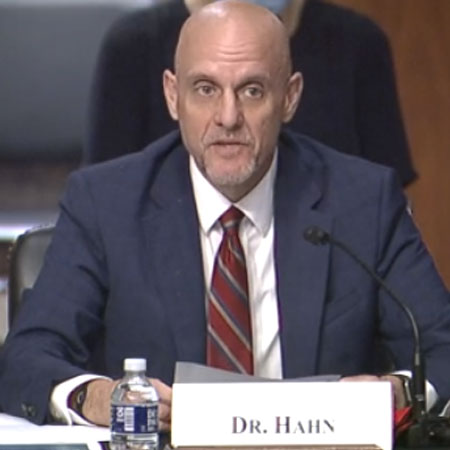Coronavirus Update: Spooked By America’s COVID-19 Vaccine Skepticism, FDA Promises Not To Lower Standards
Plus: Inovio Unveils Phase I Data, Reaction To Remdesivir Price
Executive Summary
The FDA has released detailed guidance to COVID-19 vaccine manufacturers setting out the safety and efficacy standards required, and pledged to not cut corners.
Spooked By America’s COVID-19 Vaccine Skepticism, FDA Promises Not To Lower Standards
The US Food and Drug Administration commissioner Stephen Hahn has pledged that the agency will not lower its safety and efficacy standards in order to approve quickly any COVID-19 vaccine.
Hahn was giving testimony to the Senate Health, Education, Labor and Pensions Committee in Washington DC at a hearing on 30 June, and made a point of directing his reassurances directly at the American people.
This week has seen a rapid rise in the number of COVID-19 infections in the US, especially in states such as Arizona, California, Texas, and Florida, with warnings from public health leaders that the situation is out of control once again after a steady decline achieved in May.
Many people around the world are looking to rapid development and approval of a vaccine for COVID-19 to address the pandemic, and the FDA and other leading international regulators are already working closely with a number of companies leading that race.
However a poll of US citizens conducted in May by the Associated Press-NORC Center for Public Affairs Research found 31% were not sure if they would take up vaccination, while 20% said they would refuse it.
These figures were raised by senators questioning Hahn, who was speaking alongside infectious diseases leader Anthony Fauci and the Centers for Disease Control and Prevention’s director Robert Redfield.
“The American people should know that we have not lost sight of our responsibility to maintain our regulatory independence and ensure that our decisions related to all medical products, including COVID-19 vaccines are based on sound science and the available data,” said Hahn. “This is a commitment the American public can have confidence in, and that I will continue to uphold personally.”
Hahn's testimony coincided with the release of a detailed document from the FDA, laying out many of the safety and efficacy standards that the agency will apply to the vaccines, once filed. These could come as early as September, with AstraZeneca PLC forecasting its vaccine candidate AZD1222 may have produced enough safety and efficacy data by then, with candidates from Moderna and Pfizer potentially not far behind.
There are also concerns that President Trump may try to exert pressure on officials to rush through an Emergency Use Authorization (EUA), as was seen with the repurposed antimalarial hydroxychloroquine. The FDA is also having to deal with claims that its independence has been compromised by the White House's own Warp Speed initiative to fast track vaccines.
Hahn added: "While the FDA is committed to help expedite this work, we will not cut corners in our decision making. And we are making clear in our guidance, what are the data that we need that should be submitted to meet our regulatory standards of approval. This is particularly as important as we know that some people are skeptical of vaccine development efforts."
He said the FDA guidance urged the inclusion of "diverse populations" in all phases of clinical development, including populations most affected by COVID-19, and specifically racial and ethnic minorities. It also calls for adequate representation in late phase trials of elderly individuals, and those with medical co-morbidities.
At the same time, the Development and Licensure of Vaccines to Prevent COVID-19 document also makes it clear that an overall efficacy level of around 50% – ie, where the vaccine provides full protection to only half of those who receive it – would be acceptable. This is a similar level to that achieved by some seasonal flu vaccines, however many of the frontrunners developing COVID-19 vaccines are confident that efficacy can exceed this level. (Also see "COVID-19 Vaccine Should Demonstrate At Least 50% Effectiveness, US FDA Says" - Pink Sheet, 30 Jun, 2020.)
Gilead's Remdesivir Price Sets Reasonable Standard, ICER Says
Gilead Sciences Inc. made a “responsible” pricing decision for remdesivir based on currently available information about its usefulness in treating COVID-19, the US Institute for Clinical and Economic Review said in a statement released on 29 June. It's also "a promising sign for pricing decisions for other treatments for COVID-19,” ICER president Steven Pearson said.
Gilead has announced the drug will cost $390 per vial for government payers in developed countries and $520 for commercial payers in the US. That translates to a cost of $2,340 for governments and $3,120 for US health plans for a six-vial, five-day course of treatment. (Also see "Gilead Sets Remdesivir Price, Commits Nearly All Near-Term Supplies To US" - Scrip, 29 Jun, 2020.)
Pearson applauded the decision in light of the fact that “Gilead has the power to price remdesivir at will in the US and no government or private insurer could even entertain the idea of walking away from the negotiating table.” In addition, “many Wall Street analysts were urging and citing probable figures around $5,000 per treatment course.”
However, Gilead's pricing is only reasonable under two assumptions, Pearson cautioned. They are that a five-day course of treatment is used, despite the fact that clinical studies have used a 10-day course, and that ongoing research definitively demonstrates a mortality benefit.
“This mortality benefit is not an unreasonable assumption at the current time but has yet to be shown in data with statistical certainty,” Pearson noted.“This caveat, and the need for further research to determine the true longer-term risks and benefits of remdesivir, should not be overlooked.” He added that if a clear mortality benefit is not shown by additional data, “the price of the drug should be dramatically reduced.”
The roughly $3,000 price for commercial plans, which will apply to Medicare and Medicaid reimbursement as well, is in line with ICER’s recent estimate that up to a $2,800 cost effectiveness benchmark price for remdesivir would be reasonable for a 10-day course, assuming that dexamethasone is the standard of care. (Also see "ICER Boosts ‘Cost-Recovery’ Benchmark Price For Remdesivir To Reflect Gilead’s Planned R&D" - Pink Sheet, 25 Jun, 2020.)
The analysis also suggested that a "cost recovery" price of $1,600 would enable Gilead to recoup its coronavirus-specific development costs during the first year, which the company has said will total $1bn. Therefore, the announced price of around $3,000 would enable the company to make a “substantial” profit, according to ICER.
Pearson noted some stakeholders might criticize that level of profit but others will feel it sends “needed signals to the life sciences industry that further investment in what may be a risky development process for additional treatments for COVID-19 is a reasonable business decision.”
Pfizer Inc. has also signaled that it will price its COVID-19 vaccine in line with other vaccines, with an eye toward profit but allowing for discounts during the pandemic. (Also see "Pfizer CEO Bourla Wants Profit From COVID-19 Vaccine" - Scrip, 30 Jun, 2020.)
Inovio Joins Warp Speed, Hopes To Start Phase II/III This Summer
Positive interim clinical data for its SARS-CoV-2 vaccine candidate INO-4800 in hand, Inovio Pharmaceuticals Inc. announced on 30 June that INO-4800 will be used in a non-human primate challenge study as part of the US government’s Operation Warp Speed. The company hopes to expand its Phase I trial to add older participants and plans to initiate a Phase II/III trial this summary, “upon regulatory concurrence.”
The clinical data come from the first two Phase I cohorts with initial enrollment of 40 healthy adult volunteers aged 18-50 at two US sites. Both 1mg and 2 mg dose cohorts were deemed generally safe and well tolerated in all participants through week 8. There were no serious adverse events; all 10 reported AEs were grade 1 and most were local injection site redness. To date, 94% of participants (34/36) demonstrated overall immunological responses, both humoral and T-cell.
Generating both antibody and T-cell immune responses is a key feature of Inovio’s DNA vaccines, the company noted. Inovio previously demonstrated antibody and cellular responses with a Middle East Respiratory Syndrome (MERS) vaccine, INO-4700, which has reached Phase II. In addition, Inovio’s candidate is the only nucleic-acid based vaccine that is stable at room temperature for more than a year and does not need to be frozen for transport of long-term storage, “which are important factors when implementing mass immunizations to battle the current pandemic,” the company explained. Inovio has already received US government funding to support production. (Also see "Coronavirus Update: COVID-19 Funding Crisis For UK Medical Charities, Inovio Gets US Government Cash" - Scrip, 24 Jun, 2020.)

